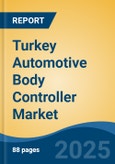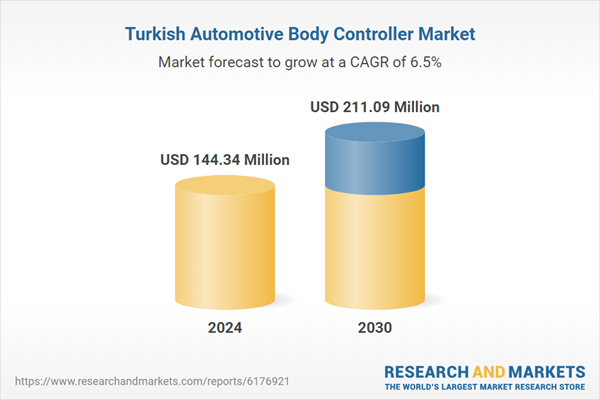Speak directly to the analyst to clarify any post sales queries you may have.
10% Free customizationThis report comes with 10% free customization, enabling you to add data that meets your specific business needs.
Turkey’s automotive body controller market is witnessing robust growth owing to the rising integration of electronic modules in modern vehicles. According to the Organisation Internationale des Constructeurs d'Automobiles (OICA), Turkey produced over 1.35 million vehicles in 2023, making it one of Europe’s top vehicle manufacturing hubs. The growing complexity of vehicle functions such as power windows, automatic lighting, and HVAC has led to increased reliance on body control modules (BCMs). As per the European Automobile Manufacturers Association (ACEA), the average electronic cost per vehicle in Europe crossed 35% of the total vehicle cost by 2023, driving BCM demand.
The proliferation of electric and connected vehicles is a key growth lever. According to Turkey’s Ministry of Industry and Technology, the country aims to have 1 million electric vehicles on road by 2030, with supportive local EV production initiatives. As per IEA data, global EV sales grew 35% in 2023, directly influencing the embedded electronics industry. Rising consumer preference for intelligent in-vehicle features is fostering greater BCM integration. In line with European trends, the share of vehicles equipped with ADAS features in Turkey grew by 27% in 2023, based on TÜİK data. These evolving expectations are prompting Tier-1 suppliers to deliver modular and software-centric body controllers.
However, the market also faces challenges like supply chain constraints. The European Chips Act Report (2024) reveals that chip shortages reduced vehicle output across several Turkish OEMs by 12% between 2021-2023. Rising cost pressure on raw materials is another concern. The Turkish Statistical Institute (TÜİK) noted that automotive component inflation rose by 14% year-over-year in 2023. Furthermore, cybersecurity risks are rising with increased connectivity; ENISA's Automotive Threat Landscape 2024 found a 23% rise in automotive firmware attacks across Europe. These operational and technological barriers may temper short-term growth momentum.
Market Drivers
Rising Demand for Vehicle Electrification
The shift toward electric mobility is a key factor fueling the demand for advanced body controllers. With electric vehicles requiring enhanced integration of subsystems like battery management, thermal controls, and intelligent lighting, body controllers play a critical role. According to the International Energy Agency, EV sales in Turkey rose by over 150% in 2023. Electrified drivetrains and auxiliary components need more sophisticated coordination, which body controllers provide. Government initiatives, such as Turkey’s domestic EV production under TOGG and incentives for EV adoption, further contribute to the increasing demand for electronic control modules across all vehicle segments.Key Market Challenges
Semiconductor Supply Constraints
Persistent global chip shortages have disrupted BCM production across automotive OEMs. According to the European Chips Act Report (2024), Turkish vehicle manufacturers experienced a 12% production drop due to semiconductor delays between 2021 and 2023. Body controllers, being semiconductor-intensive units, are particularly vulnerable. Since Turkey relies heavily on imports for advanced microcontrollers and SoCs, supply bottlenecks extend lead times and inflate production costs. The limited domestic capacity for chip fabrication further compounds this challenge, making OEMs and Tier-1 suppliers highly sensitive to global supply chain fluctuations and geopolitical trade dynamics.Key Market Trends
Shift Toward Centralized Electrical Architecture
The traditional decentralized ECU (electronic control unit) approach is gradually being replaced with centralized vehicle architectures. This change allows a single or fewer high-capacity body controllers to manage multiple vehicle domains like lighting, climate control, access, and infotainment. Centralized architectures reduce wiring complexity, improve system response time, and enable seamless over-the-air updates. As Turkish OEMs align with global trends, the body controller is evolving into a domain controller, capable of handling not just body functions but vehicle-wide data processing. This transition demands controllers with higher processing power, cybersecurity features, and flexibility in configuration.Key Market Players
- Aptiv PLC
- Denso Corporation
- Hella
- Infineon Technologies
- Lear Corporation
- NXP Semiconductors
- Robert Bosch GmbH
- STMicroelectronics
- Valeo
- Visteon
Report Scope:
In this report, the Turkey Automotive Body Controller Market has been segmented into the following categories, in addition to the industry trends which have also been detailed below:Turkey Automotive Body Controller Market, By Vehicle:
- Two-Wheeler
- Passenger Car
- Commercial Vehicle
Turkey Automotive Body Controller Market, By Component:
- Hardware
- Software
Turkey Automotive Body Controller Market, By Range:
- High End
- Low End
Turkey Automotive Body Controller Market, By Application:
- Engine Control Modules
- Transmission Control Modules
- Powertrain Control Modules
- Electronic Braking Control Modules
- Steering Control Module
- Others
Turkey Automotive Body Controller Market, By Region:
- Marmara
- Central Anatolia
- Aegean
- Mediterranean
- Black Sea
- South-Eastern Anatolia
- Eastern Anatolia
Competitive Landscape
Company Profiles: Detailed analysis of the major companies present in the Turkey Automotive Body Controller Market.Available Customizations:
With the given market data, the publisher offers customizations according to the company’s specific needs. The following customization options are available for the report.Company Information
- Detailed analysis and profiling of additional market players (up to five).
This product will be delivered within 1-3 business days.
Table of Contents
Companies Mentioned
- Aptiv PLC
- Denso Corporation
- Hella
- Infineon Technologies
- Lear Corporation
- NXP Semiconductors
- Robert Bosch GmbH
- STMicroelectronics
- Valeo
- Visteon
Table Information
| Report Attribute | Details |
|---|---|
| No. of Pages | 88 |
| Published | September 2025 |
| Forecast Period | 2024 - 2030 |
| Estimated Market Value ( USD | $ 144.34 Million |
| Forecasted Market Value ( USD | $ 211.09 Million |
| Compound Annual Growth Rate | 6.5% |
| Regions Covered | Turkey |
| No. of Companies Mentioned | 10 |









